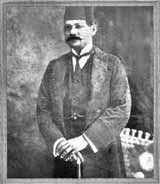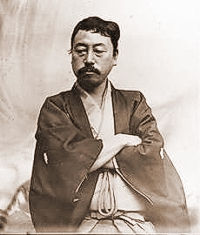Okakura Kakuzō February 14, 1862 – September 2, 1913) was a Japanese scholar who contributed to the development of arts in Japan. Outside of Japan, he is chiefly remembered today as the author of The Book of Tea
Okakura was a high-profile urbanite who had an international sense of self. In the Meiji period he was the first dean of the Tokyo Fine Arts School (later merged with the Tokyo Music School to form the current Tokyo University of the Arts). He wrote all of his main works in English. Okakura researched Japan's traditional art and traveled to Europe, the United States, China and India. He emphasised the importance to the modern world of Asian culture, attempting to bring its influence to realms of art and literature that, in his day, were largely dominated by Western culture.
His book, The Ideals of the East (1904), published on the eve of the Russo-Japanese War, is famous for its opening line, "Asia is one." He argued that Asia is "one" in its humiliation, of falling behind in achieving modernization, and thus being colonized by the Western powers. This was an early expression of Pan-Asianism. Later Okakura felt compelled to protest against a Japan that tried to catch up with the Western powers, but by sacrificing other Asian countries in the Russo-Japanese War.
Macleod, the disciple of Vivekananda, brought him to India from Japan. He stayed in Belur Math and was propagating the history of the freedom movements of different countries. He gradually injecting patriotism to the Bengali youths. He had close contact with Rabindranath.
Pashtun hero of Bengal, Wajid Ali Khan.
Wajid Ali Khan Panni (Chand Mian): An unsung hero

K. Z. Islam
Sulaiman Karrani, a descendant of Sher Shah Suri, was the governor of South Bihar under the rule of Bahadur Shah in 1555. Bahadur Shah ruled peacefully for six years when he was succeeded by his brother Jalal Shah but his throne was usurped by Giasuddin. At this Sulaiman Karrani, governor of South Bihar, sent an army led by his brother Taj Khan Karrani who killed the usurper and established himself at Gaur.
With this event the Karrani Afghan rule was established in Bengal; and once again Bengal and Bihar were united under one administration. The Karranis had been gathering strength in South and South-Eastern Bihar since Sulaiman Karrani's appointment as governor in that region. His elder brother Taj Khan Karrani was an important noble under Sher Shah. The Karranis maintained a cordial relationship with the Mughals.
Shortly after having captured Gaur, Taj Khan Karrani died in 1563. Sulaiman Karrani then directly took over the administration of Bengal along with Bihar. He ruled from 1563 to 1572 during which period Bengal had once again a brief spell of power and progress. This was due mainly to a number of special circumstances particularly because the Karranis continued to follow their predecessor's policy of placating the Mughal emperor. Sulaiman Karani in effect exercised independent authority under his jurisdiction. His most outstanding achievement was the conquest and annexation of Orissa in 1567.
Sulaiman died in 1573 and was succeeded by his son Bayazid Khan Karrani. Unfortunately Bayazid was killed in the same year and his younger brother Daud Khan Karrani was installed on the throne. Daud continued his brother's policy of independence. He was doubtless emboldened to do so in view of the vast resources and military strength which his father Sulaiman had built up. It is stated that Daud on accession had 40,000 well mounted cavalry, and 3,300 elephants and 140,000 infantry. Daud with his strength thought he could defy Mughal rule and started the conflict. Akbar's army led by Munim Khan defeated Daud. Daud's horse, in course of his flight, was stuck fast in a quagmire and he was taken prisoner. Akbar's general Khan Jahan, considering a living Doud likely to be a source of disturbance and insurrection, ordered his immediate execution.
Thus ended the life and struggle of the illustrious Daud Khan Karrani, the last Afghan king of Bengal, Bihar and Orissa. His outright execution was undoubtedly unfortunate. One cannot help noting the total absence of chivalry on the part of this Mughal General Khan Jahan. If he had possessed one quarter of the chivalry of Munim Khan, his predecessor in office, he could have never extended his hand to the perpetration of this brutality, which was as ferocious as it was ungallant. With Daud's exit, the independent Muslim royalty in Bengal and the Afghan era of its history came to an end.
A small consideration was shown to the family of Bayazid Khan Karrani (Daud's brother) as his wife and son Sayeed Khan Karami was taken to Fatehpur Sikri and kept in prison. A few years later, Prince Aurangzeb was impressed with Sayeed Khan's knowledge of Islam and was pleased to get him married to an Afghan girl from the "Panni" tribe of Afghanistan. Aurangzeb recommended to the then emperor Jahangir to release him from custody. The emperor was pleased to release them and gifted Sayeed Khan Panni with a Jagir in Atia Pargana in Bengal.
Sayeed Khan Panni settled in Atia in Tangail and established a flourishing Jagir. The Atia Mosque built in 1610 still exists and appeared some years ago in the Bangladesh Ten Taka currency note.
We now come to the illustrious Wajid Ali Khan Panni (Chand Mian) born on the 25th April 1871, 13th in the direct linage of Sulaiman Khan Karrani, King of Bengal, Bihar and Orissa.
Chand Mian is an exception in the annals of knights, Nawabs, rulers of the Indian subcontinent as he was the only personality who took an active part in the Independence Movement against the British which earned him the title of "Atiar Chand".
Chand Mian took active part in politics of Bengal and he was the Chairman of the meeting held in Dhaka in 1906 when the Muslim League was founded. All the illustrious Muslim leaders of India were present in the meeting.
He joined the Swadeshi movement and played an active role. For this Chand Mian was arrested in 1921 and sentenced to full one-years rigorous imprisonment. Being a ruler the British offered to condone the sentence if he apologised. But Chand Mian refused to do so and for a full year he was incarcerated in Alipur jail in Calcutta. This act is unprecedented as there is no record of a state ruler undergoing prison sentence during British rule. He was released on 2nd June 1922.
A momentous incident was the visit of Chittaranjan Das to Karatia, an outstanding event in those days. There were 3 days of festivity - Bangla culture, music, jatra, jarigan and other celebrations - which left C.R. Das most impressed.
After his release from the jail Chan Mian concentrated on the promotion of social, educational, and healthcare activities. He founded the Sadat College in the name of his grandfather. The first principal was the renowned educationalist Principal Ibrahim Khan. This was a great boost for the Muslims who were lagging behind in education. Chand Mian also founded a school in the name of his father Hafez Mahmud Ali Khan. The education was practically free for the poor students. These educational institutions presently have more than 15,000 students.
He improved the communications in Karatia and contributed generously to the publication of books. On the 21st February 1926 he donated his entire estate for the benefit of the promotion of education, health, other social benefits and maintenance of religious institutions and mosques of the people of Karatia. He became known as the "Second Mohsin" of Bengal. In the context of Bengal he certainly rated at the largest benefactor.
He gave permanent settlement rights to his tenants. All zamindars and landlords of the time went against him for this action. He protected the weavers from British prosecutions and exempted them from taxes and land revenues.
It is regrettable that in Bangladesh we do not recognise the contribution of our forefathers who worked selflessly for the benefit of the poor and down trodden. Today no memorials exist in the name of Chand Mian. On the 25th of April is the seventy second death anniversary of this great man. Lest we forget let us recall some of his contribution

No comments:
Post a Comment